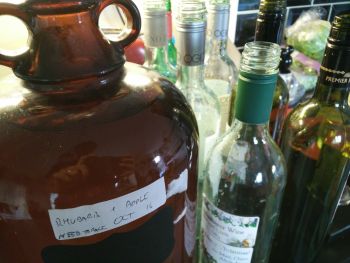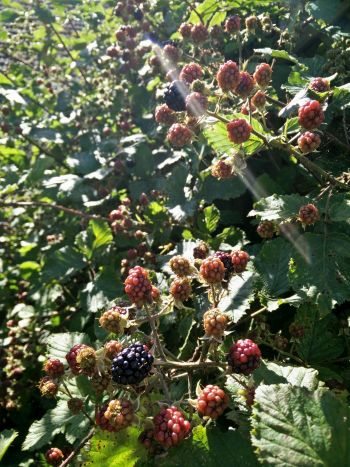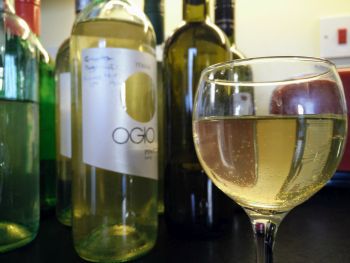9:23pm, 31st May 2018
Homebrew Wine Recipes for One Favourable Effect, That Effect being Drunkeness, from the Dog-eared Notebook of the Author
 "Write what you know," they say. Easier said than done with sci-fi & fantasy though, innit? I've never actually worked in a magic cotton factory or cut a barbarian's knob off or run experiments on a Jovian moonbase.
"Write what you know," they say. Easier said than done with sci-fi & fantasy though, innit? I've never actually worked in a magic cotton factory or cut a barbarian's knob off or run experiments on a Jovian moonbase.
But I have brewed wine--lots and lots of wine--and now I've written a story about brewing wine, too! (When I say now, I mean it was published three months ago. I am not very good at timely blog posts.) And whilst I can't guarantee the magical effects of the recipes in that story (though you never know), I can guarantee that all the recipes are real recipes, describing a real method, and would get you real wine at the end of the day. Probably real drunk, too.
The story doesn't make the recipes particularly readable, though, and some of the quantities are a bit off (my fault, sorry), so here's a proper breakdown of the four recipes. And don't worry: unlike the story, you can just use tap water.
If you've never homebrewed wine at all, by the way, and want an easy way to get started, I wrote about that here: Homebrewing the Easy Way. All these recipes will be for one demijohn (about 6-7 bottles), but you can easily double or triple stuff up (though you never need to scale the yeast up; the whole point is that it does that itself).
Dandelion Wine, To Capture the Eye of A Gentleman
Well, this is awkward. We're starting with the one recipe you shouldn't bother with.
Okay, so good dandelion wine must be possible. But I've tried it once, and it was a lot of faff, and it wasn't really worth the effort. You have to pick a carrier bag full of dandelions in flower, then remove all the leaves, and to do that you have to do it quickly before the plucked flowerheads curl up, and just... don't bother.
It's actually the recipe that prompted the story, because my note to myself in my recipe book was "all the dandelions in the garden on a warm May afternoon" and that sounded more like a magic spell than a recipe, but I've never been tempted to make it again.
If you do want a flower wine though, elderflower is pretty reliable. I'll tell you about that instead.
- Half a carrier bag of elderflowers. Early June is usually about the right time to collect them, when the flowers are all open and white. Cut the flowers off the stalks with scissors; you'll never get rid of all the green, but you'll get most of it. Check for bugs while you do this bit, there'll be plenty. Drop them in your plastic tub as you go.
- 2 litres of boiling water, poured over the flowers. They'll turn brown when you do and everything will smell of cat piss. It does taste better than that when you're done, I promise.
- Add a tablespoon of lemon juice, a mug of strong black tea, and a crushed Campden tablet to kill off anything lurking on the flowers. Mash it about a bit (I literally use a potato masher) over the next four days.
- After said four days, dissolve 900g (2lb) of sugar into a litre of white grape juice in the demijohn, strain the flower syrup into the demijohn, top up with water if necessary and add a teaspoon each of yeast and nutrient.
- Rack it when fermentation is finished (about a month); ready after about six months total. Lovely when chilled.
Elderberry Wine, To Deepen Love and Turn Courtship to Marriage
If you didn't take all the elderflower off the trees in June, you should have elderberries by September. It's a lovely wine, but by the gods is it a pain in the arse. Consider yourself warned.
- ~1kg/2lb elderberries (half a carrier bag). You need to get them off the stalks, which by this time are turning brown and woody and make the wine bitter, so you really do need to get the berries off properly. But it's such a bloody faff. The line about "a great deal of patience" in the story is not an exaggeration. The easiest way is to freeze the berries then shake them off, or use a fork to flick them off. It's still a faff either way.
- Boil the berries up in three litres of water in a pan and leave it to simmer for twenty minutes. Keep an eye so it doesn't boil over, because it stains everything. This is more hassle than fruit wines usually are, and results in more washing up. It's a good job this wine is so tasty else it wouldn't be worth all this effort. FAFF FAFF FAFF.
- Pour the liquor back into your plastic tub (not straight into the demijohn, the hot liquid might crack the glass) and add a litre of red or purple grape juice, a tablespoon of lemon juice and a mug of strong black tea.
- Put 900g of sugar (2lb) in your demijohn, then pour the liquor into the demijohn once it's cool enough (under 30C) and add the yeast and nutrient.
- Rack it when fermentation is finished. Takes ages to be ready; probably not at its best until it's about a year old.
Brambleberry Wine, To Overcome the Bitterness of Betrayal
 BLACKBERRIES! Best foraging fruit going. I love me some brambles, and I love eating them raw, eating them in a crumble, or making gallons and gallons of delicious wine with them. Brambling itself is a pretty relaxing way to spend an hour--out in the sunshine and countryside, ambling about looking for bushes, choosing the juiciest berries and eating the odd one or five as you go--and the wine is dead easy to make. This is my favourite of all the wines in this post.
BLACKBERRIES! Best foraging fruit going. I love me some brambles, and I love eating them raw, eating them in a crumble, or making gallons and gallons of delicious wine with them. Brambling itself is a pretty relaxing way to spend an hour--out in the sunshine and countryside, ambling about looking for bushes, choosing the juiciest berries and eating the odd one or five as you go--and the wine is dead easy to make. This is my favourite of all the wines in this post.
- 4lb/1.8kg of blackberries. When they're ready depends on the particular strain of blackberry, but it's usually late August/early September in my experience; tradition says you shouldn't pick them after Michaelmas though, for the Devil spits on them that day. Only pick the ripest berries, without any white mould one them. There's always another bush round the corner anyway. You can totally freeze them, by the way, and save up two or three afternoon's worth of brambles for one big winemaking session. Pro tip: don't take a plastic carrier bag, it'll snag on all the prickles and you'll lose everything. Paper bags are good (Primark's are perfect). Oh, and wear jeans and long sleeves.
- Chuck 'em all in your big plastic tub and pour three litres (about two kettles) of boiling water over them. I don't bother rinsing them first. Mash it about a bit and leave it to cool.
- Once it's cooled after a couple of hours, add your mug of strong black tea, lemon juice, litre of grape juice (red/purple), yeast and nutrient. Put a teaspoon of pectolase (aka pectic enzyme) in too, so you get a clear wine. Not the end of the world if you haven't got any about, but it helps.
- Ferment on the fruit for five days, stirring twice a day. It should get a nice froth on it within 24 hours. If not, get some warm water in a mug, add a few tablespoons of sugar and a bit of lemon juice, and add some yeast and nutrient to that. That should start fermenting after a while, then you can just tip that into the tub. Yeast needs acid, sugar to do its thing; if you've not got anything going on, it's usually a lack of one or both of those in my experience. If you're brewing indoors you're usually in the right temperature range (18-24) but it can be worth standing it by a radiator if the house is cold and nowt's going on.
- Pour 900g (2lb) of sugar into a demijohn and strain the liquor onto it. I usually do this by stretching a muslin bag over a plastic bowl, pouring through that, then squeezing the juice out of what's caught in the bag. It makes a bit of a mess and leaves you with, essentially, a bramble turd in your hand, but it gets the most out of the fruit. You can then just pour the liquor out of the bowl into the demijohn with a funnel.
- Rack it when it's done bubbling etc. etc. and it should be ready after about six months total. A little longer sometimes works out best for reds, though, so if it's not all that at six months, put it aside for a while and try it again later. (The important corollary to this is: if you taste some homebrew and it's delicious, DRINK IT ALL NOW BEFORE IT GOES PAST ITS BEST. Homebrew wine is ever changing, literally week by week, so if the going is good then make the most of it.)
BONUS RECIPE: you can make elderberry and bramble wine by half & halfing the fruit (i.e. 1lb elderberries, 2lb brambles) and it is bloody delicious. More rounded and deep than bramble alone, ready faster than elderberry alone and less faff too (less fruit to get off!). Follow the elderberry method.
All the red fruits mix really well for wine, actually, though if you're not using elderberry you can follow the easier method here. Go forth and experiment. Glory awaits. Make notes as you go.
Rhubarb Wine, To Find Peace with Oneself and One's Life
 Rhubarb is a classic. I've tried mixing it with various other fruits, but honestly, it works best on its own. Pretty much the same method as the bramble i.e. piss easy; to be honest this is more or less the basic method for making fruit wine, and works with plums, apples, raspberries, whatever you can get your hands on. If you don't know any different (like for elderberry) this'll see you right most of the time.
Rhubarb is a classic. I've tried mixing it with various other fruits, but honestly, it works best on its own. Pretty much the same method as the bramble i.e. piss easy; to be honest this is more or less the basic method for making fruit wine, and works with plums, apples, raspberries, whatever you can get your hands on. If you don't know any different (like for elderberry) this'll see you right most of the time.
- ~2kg/4lb of rhubarb. I can't get enough in one go from my plant, so I pull it, clean it and cut it into chunks to freeze until I have enough.
- Chuck it all in the plastic tub. Three litres (two kettles) of boiling water. A litre of white grape juice. Let it cool, then black tea, lemon juice, yeast and nutrient. You're getting the idea by now.
- Ferment on the fruit for five days, keep stirring it. Strain it through a muslin bag, get weirded out by the rhubarb turds you end up with, pour the liquid onto 900g (2lb) of sugar in a demijohn.
- Rack/wait/blah blah blah. About six months. Nice chilled, but also nice at a cool room temperature, to bring the flavour out. Should come out a clear pale gold. Bloody lovely.
Just Make it Up
Honestly, most the fun of homebrew is trying something weird and seeing if it works out. Carrot wine is very tasty. My wife likes the coffee wine, though I can't stand it. My favourite was chucking all the random red fruit I had left at the end of the summer into the pot (including the gin-soaked sloes); that came out about 20% ABV and was the tastiest thing I've ever made, and I'll never be able to recreate it. Mint wine tastes like mouthwash, don't bother with that, and the black tea was too astringent for my tastes.
Once you're making the wine above, you got this. Sure, there are better approaches that produce more consistent results of a higher quality, but as said in the other homebrew post, this is Fuck It That'll Do brewing. It's 50% of the effort for 90% of the result. If you're consistently clean with sterilising and careful not to get any yeast into the demijohn when racking off, you're pretty much golden. Boiling water, 2lb of sugar, black tea, lemon juice and yeast will get you alcohol out of just about anything. Let me know if you come up with anything good.
&